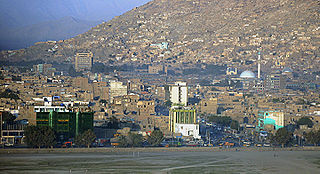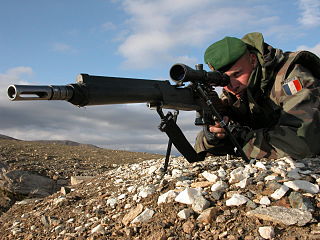Operation Athena was the Canadian Forces' contribution to the International Security Assistance Force (ISAF) in Afghanistan. The operation was divided in two phases: the first one took place from July 2003 to July 2005 in the Kabul region and the second one from August 2005 to December 2011 in the Kandahar area. The operation's main objective was to improve Afghanistan's security and governance. Operation Athena in Kandahar constituted the longest combat mission in the history of Canadian Forces. With over 40,000 Canadian military members that, at some point, entered the country—often several times—this operation constitutes the largest military deployment of the Canadian Forces since World War II.

The United Nations Assistance Mission in Afghanistan is a UN Special Political Mission tasked with assisting the people of Afghanistan.
United Nations Security Council Resolution 1746, adopted unanimously on March 23, 2007, after reaffirming all resolutions on the situation in Afghanistan, including resolutions 1659 (2006) and 1662 (2006), the Council extended the mandate of the United Nations Assistance Mission in Afghanistan (UNAMA) for an additional period of twelve months, until March 23, 2008.

On 28 January 2010, an International Conference on Afghanistan was held at Lancaster House in London, where members of the international community discussed the further progress on the Petersberg agreement from 2001 on the democratization of Afghanistan after the ousting of the Taliban regime. The one-day conference, hosted by the United Kingdom, the United Nations, and the Afghan government, meant to chart a new course for the future of Afghanistan and brought together foreign ministers and senior representatives from more than 70 countries and international organizations. The conference was attended by the Afghan president Hamid Karzai, US Secretary of State Hillary Clinton, EU High Representative Catherine Ashton, President of the European Council Herman Van Rompuy, British prime minister Gordon Brown, UN Secretary-General Ban Ki-moon and NATO Secretary-General Anders Fogh Rasmussen, as seen at right. Participants also included the Afghan Minister of Foreign Affairs Rangin Dadfar Spanta, UN envoy Kai Eide and the British Foreign Secretary David Miliband, as well former Afghan minister of finance Ashraf Ghani. Afghanistan agreed to timetables to take control of certain military and police functions, and launched a program to lure Taliban insurgents back to mainstream life with financial incentives.

United Nations Security Council Resolution 1917, adopted unanimously on March 22, 2010, after recalling its previous resolutions on Afghanistan, in particular resolutions 1868 (2009), 1662 (2006) and 1659 (2006), the Council extended the mandate of the United Nations Assistance Mission in Afghanistan (UNAMA) until March 23, 2011 and realigned its mandate to assist with government-led recovery efforts.

United Nations Security Council resolution 1378, adopted unanimously on 14 November 2001, after reaffirming all resolutions on the situation in Afghanistan, including resolutions 1267 (1999), 1333 (2000) and 1363 (2001), the Council affirmed that the United Nations would play an important role in the country and called for the establishment of a transitional administration leading to the formation of a new government.
United Nations Security Council resolution 1390, adopted unanimously on 16 January 2002, after recalling resolutions 1267 (1999), 1333 (2000), 1363 (2001), 1368 (2001), 1373 (2001) 1378 (2001) and 1383 (2001) concerning the situation in Afghanistan and terrorism, the Council imposed further sanctions on Osama bin Laden, Al-Qaeda, the Taliban and others associated with them.

United Nations Security Council resolution 1413, adopted unanimously on 23 May 2002, after reaffirming all resolutions on the situation in Afghanistan, particularly Resolution 1386 (2001) and resolutions 1368 (2001) and 1373 (2001) on terrorism, the council extended the authorisation of the International Security Assistance Force (ISAF) for an additional six months beyond 20 June 2002.
United Nations Security Council resolution 1444, adopted unanimously on 27 November 2002, after reaffirming all resolutions on the situation in Afghanistan, particularly resolutions 1386 (2001) and 1413 (2002) and resolutions 1368 (2001) and 1373 (2001) on terrorism, the council extended the authorisation of the International Security Assistance Force (ISAF) for a period of one year beyond 20 December 2002.

United Nations Security Council resolution 1510, adopted unanimously on 13 October 2003, after reaffirming all resolutions on the situation in Afghanistan, particularly resolutions 1386 (2001), 1413 (2002) and 1444 (2002), and resolutions 1368 (2001) and 1373 (2001) on terrorism, the council extended the authorisation of the International Security Assistance Force (ISAF) for a period of one year and expanded its operations outside the capital Kabul to other areas.

United Nations Security Council resolution 1563, adopted unanimously on 17 September 2004, after reaffirming all resolutions on the situation in Afghanistan, particularly resolutions 1386 (2001), 1413 (2002), 1444 (2002) and 1510 (2003), and resolutions 1368 (2001) and 1373 (2001) on terrorism, the council extended the authorisation of the International Security Assistance Force (ISAF) for a further period of one year.

United Nations Security Council resolution 1589, adopted unanimously on 24 March 2005, after reaffirming all resolutions on the situation in Afghanistan, particularly Resolution 1536 (2004), the council extended the mandate of the United Nations Assistance Mission in Afghanistan (UNAMA) for an additional period of twelve months until 24 March 2006.

United Nations Security Council resolution 1623, adopted unanimously on 13 September 2005, after reaffirming all resolutions on the situation in Afghanistan, particularly resolutions 1386 (2001), 1413 (2002), 1444 (2002), 1510 (2003) and 1563 (2004), and resolutions 1368 (2001) and 1373 (2001) on terrorism, the council extended the authorisation of the International Security Assistance Force (ISAF) until mid-October 2006.

United Nations Security Council Resolution 1974, adopted unanimously on March 22, 2011, after recalling previous resolutions on Afghanistan, in particular 1917 (2010), the Council extended the mandate of the United Nations Assistance Mission in Afghanistan (UNAMA) for a period of one year until March 23, 2012.

United Nations Security Council Resolution 1662, adopted unanimously on March 23, 2006, after reaffirming all resolutions on the situation in Afghanistan, including resolutions 1589 (2005) and 1659 (2006), the Council extended the mandate of the United Nations Assistance Mission in Afghanistan (UNAMA) for an additional period of twelve months.

United Nations Security Council Resolution 1707, adopted unanimously on September 12, 2006, after reaffirming all resolutions on the situation in Afghanistan, particularly resolutions 1386 (2001), 1413 (2002), 1444 (2002), 1510 (2003), 1563 (2004), 1623 (2005) and 1659 (2006) and resolutions 1368 (2001) and 1373 (2001) on terrorism, the Council extended the authorisation of the International Security Assistance Force (ISAF) until mid-October 2007.
United Nations Security Council Resolution 1776 was adopted on 19 September 2007.
United Nations Security Council Resolution 1833 was unanimously adopted on 22 September 2008.

United Nations Security Council Resolution 2120 was adopted unanimously on 10 October 2013.

International sanctions against Afghanistan were implemented by the United Nations in November 1999. The sanctions were initially aimed at terrorists, Osama bin Laden and members of Al-Qaeda. The United States, the United Kingdom and the European Union also impose sanctions on Afghanistan.













